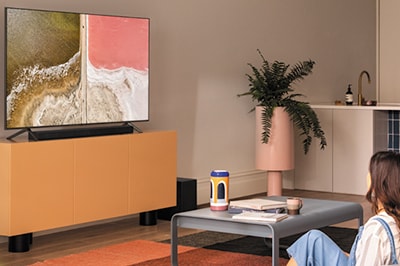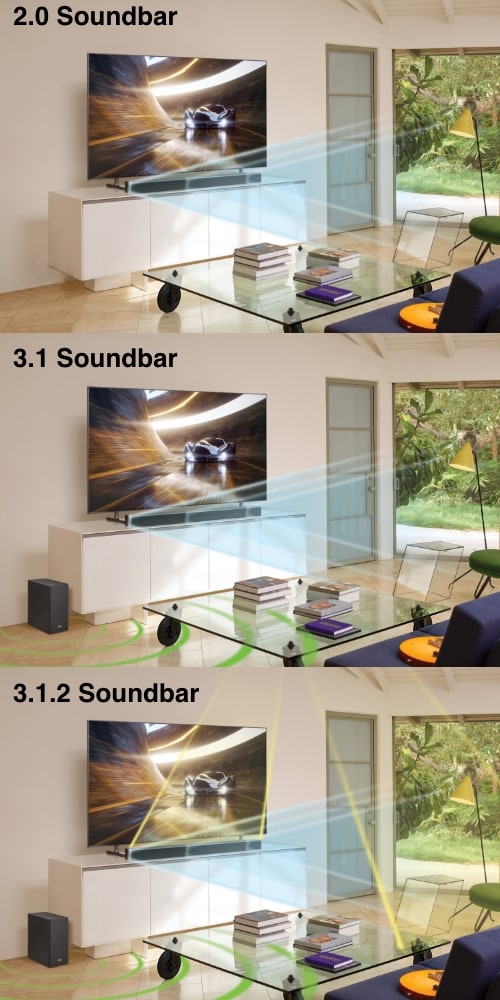Soundbar Buying Guide
Posted on February 07, 2023 By Alison P
An important component of a good home entertainment experience is crystal-clear audio, and a popular option to level-up a TV's audio is a soundbar. These devices provide a simple way to improve sound quality in a low-profile, affordable package. If you're considering joining the "bar crowd" and want to learn more, we've got the info you need to make a sound decision!
What is a soundbar?
A soundbar is a type of speaker that's usually long enough to stretch the length of your television but slim enough to blend right into your entertainment space. Soundbars are inconspicuous, affordable and easy to install, bringing you an audio experience that's just as high-definition as the images on your TV. You'll notice an instant improvement in audio - especially dialogue - on your favorite TV shows, movies, and video games. You won't need to worry about the dialogue in your favorite action movies being drowned out by an explosion or car chase; you'll hear every one-liner in all its original glory. Soundbars are also excellent when it comes to watching sports - you'll be able to hear the roar of the crowd as your team scores without missing a single word of coverage from the announcers. If you've got a Bluetooth-capable soundbar, you can pair it with your smartphone and use it to play podcasts, playlists, and more. This means when you're relaxing in your living room, you can boot up your soundbar and start playing your favorite tunes. If you've got a multi-room sound system, many soundbars are available with WiFi capabilities that allow them to easily connect. There are also many soundbar models that can integrate into a smart home network and respond to voice commands through a virtual assistant. Soundbars are a great way to enjoy auditory versatility in a unit that fits right in with any home's entertainment center.
When is a soundbar better than a traditional speaker system?
Soundbars are an ideal choice for people who are looking to enhance their TV's sound quality but may not have enough room in their living space for a full-sized surround sound system. Soundbars are pretty small, but they'll deliver an instant auditory improvement over an entertainment setup that doesn't have one already. Another benefit of soundbars is that they're very easy to install; if you're not exactly tech-savvy and are just looking for a simple plug-and-play setup, you'll find a variety of soundbars that offer just that. Best of all, soundbars are available in a wide range of prices, making it easy to find a model that works best with your budget. Soundbars can be as simple or as high-end as your wallet will allow, with many models available for under $150.
Are soundbars worth it?
TVs have come a long way in the last few years, and it's no secret that some TVs now come with high-quality built-in speakers. However, a soundbar will still always outperform TV speakers. No matter how new your TV is, a dedicated audio device is simply always going to produce better audio than your TV. In many cases, soundbars are designed to work in tandem with your particular brand of TV. For example, a wide selection of Samsung soundbars are specially built to create the perfect listening experience with their TVs. The speakers of these special units are able to sync up with the speakers on your Samsung TV to enhance your overall audio quality.
What are the different types of soundbars?
There are two major types of soundbars, giving you a baseline from which you can make the best choice for your home:
An active soundbar has all its required electronics enclosed within one unit. Active soundbars are the "plug and play" type - they don't require any outside power sources or receivers. All you'd need to do is connect your TV directly to the soundbar with an audio cable, and it's ready to go. If simplicity is a high priority, an active soundbar should be your pick.
The other option is a passive soundbar. These require a slightly more involved setup but do offer better audio quality than an active soundbar. Instead of connecting directly to your television, a passive soundbar connects to an audio receiver, which is connected to your TV. The audio from your TV then passes through the receiver before being piped through the bar. Passive soundbars require more equipment but provide a better audio experience. If you're not intimidated by soundbar systems with a little more complexity, go for a passive soundbar. Just remember you'll need to purchase the receiver separately.

There's a series of numbers listed with most soundbars. What do they mean?
While browsing soundbars, you'll notice most models have a series of two or three numbers in their name, each separated by a point. The first number indicates the number of audio channels on the soundbar. In this context, "channel" is kind of a fancy word for "speaker." For example, if a soundbar has three channels, that means there's a speaker on the left, right, and center of the soundbar. For optimal sound, we recommend a soundbar with three channels or more - it'll give you the room-filling dimension to your sound that you're seeking. The second number indicates the number of subwoofers included with the soundbar. If the numbers are 3.1, that means the sound bar has three channels plus a separate subwoofer speaker. When the sequence has a third number, it indicates the number of upward-facing channels in the soundbar, which is a feature that supports Dolby Atmos surround sound. Instead of pointing straight ahead, an upward-facing channel allows sound to bounce off the ceiling for a more immersive auditory experience. A soundbar listed as 3.1.2 means it includes a three-channel soundbar that has a subwoofer plus two upward-facing channels.
What's the difference between WiFi and Bluetooth connection to my soundbar?
A Bluetooth connection means you're controlling the audio directly through your smartphone or another Bluetooth-enabled device. It's a one-to-one connection, and keep in mind Bluetooth requires your device to stay in close range to the speaker in order to stay connected. A WiFi connection, however, means you're sending signals to a router, and the router then sends signals to the soundbar. If you're using your soundbar as part of a multi-speaker setup in different rooms of your home, a WiFi connection is imperative. Not all soundbars offer both WiFi and Bluetooth, so if having both is important to you, make sure both are included on your model of choice before you buy.
What size soundbar should I buy?
For the most aesthetically-pleasing look, it's a good idea to limit your choices to soundbar lengths that are narrower or equal to your TV, but that's just a suggestion. If you don't mind a soundbar that's longer than your TV is wide, it's your prerogative! You also need to check out the amount of space you have around your TV. If your TV is mounted and you plan on mounting your soundbar too, space shouldn't be an issue. However, if your TV is on a tight table or stand, you may need to get a smaller soundbar to accommodate the space. Regardless, any model you choose should still give you high-quality audio output.
What equipment will I need to connect my soundbar to my TV?
If you've chosen an active soundbar, all you'll need is an audio cable or an HDMI cable. If your soundbar is passive, you'll need an audio receiver as well as the required audio cables to connect your TV to the receiver, and the receiver to your soundbar. If you're planning on using your soundbar for WiFi connectivity and you don't own a router yet, you'll need to buy one and create your home WiFi setup before it can be used with your soundbar.
Can I connect my soundbar to a virtual assistant?
There are many soundbar models that are capable of connecting to a Smart Home network and working with a virtual assistant like Alexa, Siri, or Google Assistant. Check the soundbar specs of the models that interest you to see if they'll integrate with your particular virtual assistant.
Can I rest my soundbar on a surface instead of having it wall-mounted?
You can, and many soundbars are specifically built to rest on a surface, but wall-mounting a soundbar will result in a more direct projection of audio. If you do want to mount your soundbar, make sure that your model is able to be safely mounted before doing so. Youll also probably need a specific soundbar mount for your model, so make sure you get the right one for yours to ensure that it works as intended.
What are the best soundbar brands?
There are many brands that produce high-quality soundbars. One of these brands is Bose. This brand is known for high-quality audio devices, and many Bose soundbar models have Bluetooth and WiFi capabilities, making them a convenient appliance for any entertainment setup. Sonos soundbar models are all meant to immerse you in your favorite TV show or movie, and many of their models come with smart capabilities and the ability to connect to a voice assistant. This means select models can be controlled with only your voice. Samsung soundbar models come in all kinds of shapes and sizes. All of their models produce amazing audio, and come loaded with many features. With their large selection there is sure to be a model that fits in with your TV.
Ready to start shopping for a soundbar? P.C. Richard & Son offers the guaranteed best prices as well as the "Buy & Try" soundbar guarantee: if your TV doesn't sound noticeably better with your new sound bar, you can return it within 30 days for an exchange or refund.